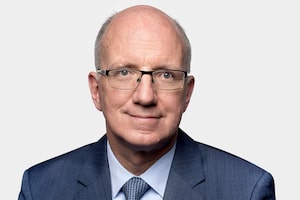The logo for Canadian mining company Teck Resources Limited is displayed above their booth at the Prospectors and Developers Association of Canada (PDAC) annual conference in Toronto on March 7, 2023.CHRIS HELGREN/Reuters
By next fall, Teck Resources Ltd. TECK-B-T chief executive officer Jonathan Price will likely be sitting on US$9-billion in cash, the payout for selling its coal mines in British Columbia.
The CEO of the country’s largest mining company will also have a long list of projects to spend that money on, including planned new mines in Mexico, Peru, Chile, the United States and Canada that will triple Teck’s copper production and make it one of the world’s largest metal producers.
In recent weeks, Mr. Price has been doing the rounds on Bay Street, telling investors that despite an almost unimaginable amount of cash on hand and soaring demand for the critical minerals Teck produces, the company will take a slow and steady approach to building new mines. The message was well-received.
Mr. Price is trying to walk the tightrope that comes with running a global mining business. Investors award premium valuations to miners that are ramping up production of metals essential to the energy transition. The same crowd punishes companies that fail to deliver projects on time and on budget, or blow their balance sheets on acquisitions.
Right now, Teck is in the latter camp. Expansion at one of its biggest mines, Quebrada Blanca (QB) in Chile, was budgeted at US$4.7-billion when Teck broke ground four years ago, ahead of the COVID-19 pandemic. The budget on QB is now up to US$8.6-billion, one of many resource projects plagued by cost overruns during the pandemic.
Investors are taking a show-me attitude as Teck seeks government approval to sell its coal business to Switzerland’s Glencore PLC GLNCY. The Vancouver-based company’s enterprise value is currently about four times its earnings before interest, taxes, depreciation and amortization (EBITDA). The largest copper producers, including Freeport-McMoRan Inc. and BHP Group Ltd., are valued at six to eight times their EBITDA.
From bad blood and public bashing to an $8.9-billion deal: How Teck made nice with Glencore
The challenge facing Mr. Price – an Oxford University-trained engineer – is to use cash from selling coal to dramatically increase Teck’s copper production without blowing through budgets. His recent investor presentations – backed by 24 slides – show how the CEO plans to hit this target and win what’s known as a “re-rating” from investors that awards Teck the same valuation as its larger rivals, a dramatic increase from today’s share price.
In presentations and media sessions, Mr. Price stressed Teck won’t start any new greenfield projects until its teams understand exactly what went wrong at QB. The short-term priority is making a decision on putting cash into extending the life of Teck’s Highland Valley project near Kamloops – Canada’s largest copper mine – by 12 years, to 2040.
Once the QB postmortem is complete, Teck will weigh moving forward with two new mines, in Mexico and Peru. The message to investors is that these are far simpler projects than QB, which required significant spending on a port and water supply.
In another move meant to curry favour with investors, Teck has pledged it will hand shareholders a significant portion of the US$9-billion coal payout, plus extra cash from its metal mines. In a report, analyst Sam Crittenden at RBC Capital Markets said the company will likely put US$1-billion into retiring debt at QB, and set aside roughly US$4-billion for building new copper mines, “leaving US$3 to US$5-billion to be returned to shareholders in the form of buybacks and/or a special dividend.”
For all Mr. Price’s planning, the fate of Teck’s expansion rests in part of eliminating construction cost overruns that plagued QB early in the pandemic. On this front, analyst Orest Wowkodaw at Scotiabank said all major mining companies are finally catching a break in the form of “modest deflation” on labour, fuel and equipment costs.
“Given the current economic uncertainty, we anticipate the majority of miners to remain relatively disciplined on sanctioning potential new greenfield growth,” said Mr. Wowkodaw. “Lower-risk and lower-capex brownfield debottlenecking projects are likely to be in focus.”
Disciplined and de-risked are words that pop up throughout Mr. Price’s PowerPoint presentation. Over the next decade, Teck plans to dramatically ramp up its copper production, spending billions from the sale of its coal business on at least nine projects, while sticking to budgets. In the words of country music artist Sam Hunt, the CEO of the country’s largest miner is going to take it slow just as fast as he can.
 Andrew Willis
Andrew Willis